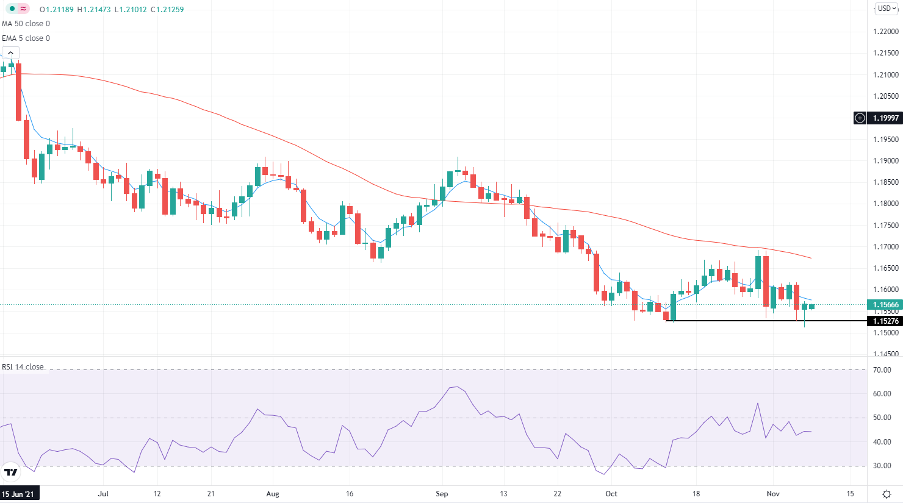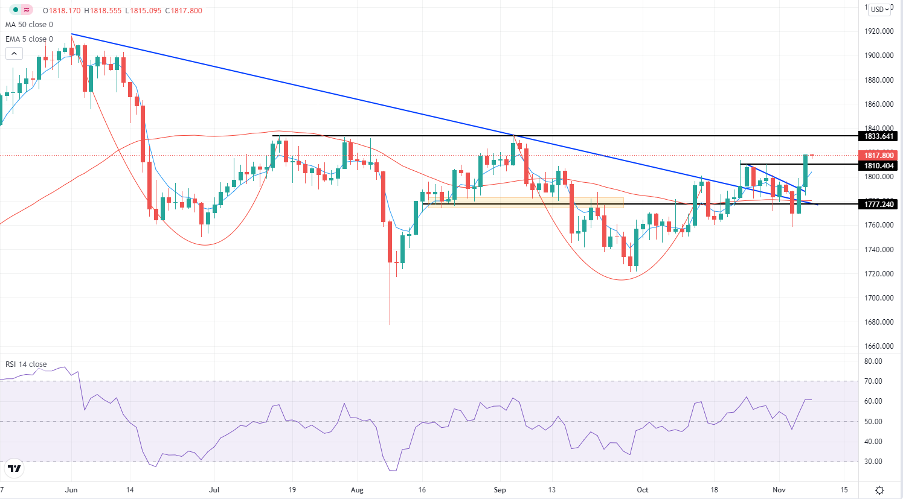- English (UK)
- US CPI (Thursday 00:30 AEDT) – consensus 5.9% YoY (headline), 4.3% YoY core
- China CPI and PPI (Wednesday 12:30 AEDT) – 1.4% and 12.5% respectively
- Aussie employment (Thursday 11:30 AEDT) – 50k jobs, u/r 4.8%
- Will we hear confirmation of who chairs the Federal Reserve into 2022?
- Can the S&P 500 grind to 4700? How far will Tesla fall on open?
- Will tensions between the EU/UK over Article 16 result in GBP selling?
In core developed markets, FX feels compelling to be tactically bullish USD given the Fed are open-minded to hikes next year and there's real reasons to believe that the Fed will be in a position to hike twice - especially given the current US labour market trends, where we could be looking at the US seeing full employment in January – the unemployment rate (U/R) is already 20bp below the Fed’s median estimate of employment for Q4 21, and as seasonal factor wane, the Nov NF payrolls report (released 4 Dec) should be very strong.
Going forward, the US labour force participation rate has become key and will be scrutinised for any signs it may head back to the pre-pandemic levels of 62.8 (average seen between 2016-2019). The Fed is largely sitting in the camp that this should rise in the months ahead and we should see increased slack back into the labour market. This is one of the big debates in macro, but the risk is it stays at similar levels and while the unemployment rate drops to 4% - subsequently, the conditions will be in place not just for an early end to QE, but for the US central bank to openly discuss the lift-off date for rate hikes.
US CPI is the key event risk this week
That makes this Wednesday’s (Thursday 00:30 AEDT) US CPI print so key – not just because the market is eyeing a near 6% YoY change in headline inflation and 4.3% in core. But, if we think this will feed into a 4% YoY change in core PCE (released 25 Nov), then we could easily be looking at inflation well above the Fed’s median projection of core PCE of 3.7% by year-end. The market is modestly long of USDs, but I do see a market that would be far more sensitive to an upside surprise in inflation than downside and prepared to add length to USDs longs, notably on a bullish closing break of 94.50 in the USDX.
Given the dynamics in the US labour market, evolving inflation and central bank divergence, EURUSD shorts seem attractive here, adding on a daily close through 1.1570.
EURUSD daily

(Source: TradingView - Past performance is not indicative of future performance.)
Upside in USDCNH should aid broad USD longs
We also see China’s CPI and PPI prints due mid-week and producer prices are expected to increase to 12.5%. Put USDCNH on the radar, as a strong print here and the Yuan should rally, pushing USDCNH into the 19 October low. In times gone by a strong Yuan would flow through to support AUD and the China proxies, but I’m not sure the Chinese want to add purchasing power to importers at this juncture. An upside break above 6.4060 could be bullish for USDs more broadly.
XAUUSD daily

(Source: TradingView - Past performance is not indicative of future performance.)
XAUUSD also needs close attention – the move lower in US real rates last week pushed the yellow metal through the recent ceiling of $1810. Gold looks to have found some form, but the Maginot line is $1833 - a break here and gold could really go on to bull run. In fact, if we look at gold in EUR terms you can see it is now breaking out. With Pepperstone you can buy and sell gold in a range of alternative currencies, where buying in the perceived weakest currency/ shorting in the strongest currency can boost the effect on P&L.
Aussie jobs in focus – watch the participation rate
Aussie jobs on Thursday are the usual lottery, but we watch the participation rate with calls this should improve 30bp to 64.8%. This should take the unemployment rate up to 4.8% even though 50k jobs are expected to be created. This is hardly the backdrop needed to see wages moving towards the magical 3% level – where the Q3 wage price index will be the big data point next week for AUD traders.
With over 3 rate hikes still priced into Aussie rates over the coming 12 months, this still feels far too lofty - I’d be selling rallies in AUDUSD this week into 0.7450 – conversely, a downside break of the 50-day MA and 50% fibo of the Sept-Oct rally would suggest momentum shorts for 0.7300 to 0.7250. I also like selling AUDNZD, not just on evolving policy divergence but the trend and technicals suggest the flow of capital is moving that way too.
How low will Tesla go?
As mentioned, it’s all eyes on Tesla – Elon Musk looks set to sell down $21b of stock – which is odd in the sense that the last thing you do when offloading a massive exposure is to reveal your hand. The buyers tend to step away when you have an overhang like this, but this is no ordinary story and is Musk’s way of getting back at the DEM’s proposal to tax the elite with gains on unrealised profits. I’d be looking for clients to flip to shorting fairly aggressively, although hold periods would be very short-term in nature.
Recall, the move in Tesla into $1222 has largely been driven by options buyers and dealers hedging, so that gamma trade will fade and this could allow increased two-way trading in the near-term.
Related articles
Ready to trade?
It's quick and easy to get started. Apply in minutes with our online application process.
The material provided here has not been prepared in accordance with legal requirements designed to promote the independence of investment research and as such is considered to be a marketing communication. Whilst it is not subject to any prohibition on dealing ahead of the dissemination of investment research we will not seek to take any advantage before providing it to our clients.
Pepperstone doesn’t represent that the material provided here is accurate, current or complete, and therefore shouldn’t be relied upon as such. The information, whether from a third party or not, isn’t to be considered as a recommendation; or an offer to buy or sell; or the solicitation of an offer to buy or sell any security, financial product or instrument; or to participate in any particular trading strategy. It does not take into account readers’ financial situation or investment objectives. We advise any readers of this content to seek their own advice. Without the approval of Pepperstone, reproduction or redistribution of this information isn’t permitted.

